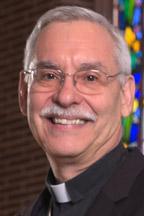
During the last century, 10 million people died in natural disasters and 400 million died as victims of human violence — a 1:40 ratio.
Ten million innocent victims of the forces of nature that God created — for instance, floods and earthquakes and hurricanes and tornados.
If God is all-powerful and all-loving, why didn't he create a safer world? And most of the 400 million who died at the hands of man were innocent too. Half of them were victims of war, including many Ukrainians on whom bombs fell, Israelis at a rock concert and 28,000 Gazans, mostly women and children. Also many others in ethnic conflicts in Congo and South Sudan and many countries of West Africa. And then all those victims of homicide — the unjust taking of human life: 100 million babies through abortion and another 100 million through gun violence. How could God let this happen? Why doesn't he intervene?
Our first reading today is the last part of the story of the greatest natural disaster of all time, the great flood that destroyed all living creatures, except the eight human beings and the pairs of animals in Noah's ark.
And here, God doesn't just let a flood occur, he causes the disaster for the express purpose of killing all these people. Sure, God has the right to punish, but what about all the innocent babies who drowned and all the animals?
The basic theological problem is this: if God is all-powerful, he can prevent evil and if he is all-loving, he wouldn't want anyone to suffer, so why does he allow bad things to happen? We have no complete answer to the mystery of human suffering — that's why it's a mystery. But there are two partial answers deriving from the fact of human freedom and the existence of a better life beyond the grave.
First, our freedom to sin — and thus cause suffering — is the necessary consequence of God's invitation to holiness. God could intervene to prevent sin only at the cost of taking away our free will and thus also depriving us of the freedom to choose.
Virtue is not merely goodness, it is the choice of good over evil, especially when the good deed is difficult or the evil is hard to resist — and there is no holiness without virtue. But God's choice to respect human freedom does not mean that we have been left defenseless in the face of evil, nor does it mean that sin has the final word.
Part of God's power consists in his ability both to respect our freedom to choose evil and then, at the same time, to be able to bring good out of the suffering caused by sin or disasters. God can write straight with crooked lines. So when Jesus's adversaries chose to execute an innocent man, God took this evil act and used it for our salvation. This happens in our own lives as well. God can take our remorse over some serious sin and turn it into a wake-up call to put us back on the right path. Some of the tests we face in life are simple, but others are so difficult that we'll get them right only if we have a good lifeline — like on the old show “Who Wants to be a Millionaire?” And God sent us Jesus to be that lifeline.
In today's Gospel, the Spirit drove Jesus into the desert to confront Satan, who in the other Gospels tries to trick Jesus, promising him painless shortcuts to success if he would just choose evil over good. But Jesus knew that while God can bring good out of evil because he is God, to think we humans could ever achieve good by doing evil is just an illusion, a bitterly deceptive desert mirage.
Moreover, he knew he had an unfailing lifeline in his heavenly Father and so no matter what evils he had to face, he knew he'd come out on top if he just did the right thing every step of the way.
You and I have the same choice: good or evil, truth or illusion, with all the eternal consequences that flow from our choice. Jesus made the right choice every time, and so is our very most reliable lifeline. The Good News is Jesus' ultimate victory over the power of evil, and today, he invites us to share in that victory by aligning ourselves with him. This is the time of fulfillment. The kingdom of God is at hand. Repent and believe in the Good News.
Bishop Anthony B. Taylor delivered this homily Feb. 18.
Please read our Comments Policy before posting.
Article comments powered by Disqus Don’t let misconceptions cause faith to waver
Don’t let misconceptions cause faith to waver
 Seniors, whatever storms may come, Jesus will be there
Seniors, whatever storms may come, Jesus will be there
 Studio 3:16 offers new approach to teaching religion
Studio 3:16 offers new approach to teaching religion
 After three decades, NLR principal plans to retire
After three decades, NLR principal plans to retire
 CHS athlete overcomes odds to reach collegiate goal
CHS athlete overcomes odds to reach collegiate goal
 St. Joseph a model of solidarity with immigrants
St. Joseph a model of solidarity with immigrants
 Two gifts after Jesus’ death: Virgin Mary and Eucharist
Two gifts after Jesus’ death: Virgin Mary and Eucharist
 Why we have an altar, and not just a communion table
Why we have an altar, and not just a communion table
 Pope: Wars should be resolved through nonviolence
Pope: Wars should be resolved through nonviolence
 Living relationship with Jesus Christ in the Eucharist
Living relationship with Jesus Christ in the Eucharist